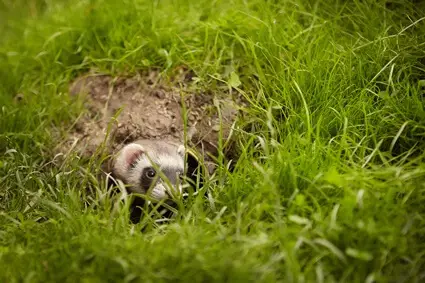Ferrets (Mustela furo) are natural predators of rodents, so there’s no need to train them to catch rats. However, some owners use ‘ferreting’ to direct rats toward a predetermined trap.
Instinctually, ferrets are good at hunting and catching rats in their burrows.
Their sharp teeth can kill rats instantly, and they’ll eat the rat, including the fur and bones. Ferrets produce a natural odor that terrifies rats, inducing stress hormones that deter them from entering a home.
Ferrets are better at ratting than dogs, including schnauzers and Jack Russels. Despite common misconceptions, ferrets aren’t part of the order of Rodentia, so they don’t get along.
Are Ferrets in The Same Family as Rats?
No, rats and ferrets aren’t members of the same family.
Ferrets are part of the family Mustelidae, comprising badgers, minks, otters, weasels, and martens.
Rats are part of the order of Rodentia, which includes mice, squirrels, and voles.
Ferrets have larger bodies than rats, excluding the rats’ tails. A female adult ferret measures 13-14 inches long, whereas adult males usually grow to 15-16 inches.
Ferrets reach their full size at around the 4-month mark. Full-grown females weigh 1-1.5 pounds, while males weigh 2-2.5 ounces.
Can You Use Ferrets To Catch Rats?
Ferrets have been used to catch rats for centuries, and some still do so for rodent control. Ferrets are natural ratters who are skilled at hunting (ferreting).
Their small heads and slender bodies allow them to move through small holes when chasing rats. Usually, they consume their prey whole, including skin, fur, and bones. Ferrets also have a fast metabolism, so they must eat frequently.
Ferrets are among the predators rats fear most. The mere sight or smell of a ferret is enough to discourage rats from living on or entering your property.

How To Train A Ferret To Hunt Rats
You don’t need to train a ferret to hunt rats.
Ferrets naturally chase down and kill rats and mice. They instinctively pursue rats on sight. You can praise and reward your ferret’s behavior to reinforce this instinct.
When they’re young, you can cultivate this by using toys to play together. This will encourage natural jumping, chasing, and biting when interacting with small, prey-like objects. Consequently, those skills will be honed when they meet a live rat.
Once a ferret is old enough to go hunting (usually around 10 months), place it in front of a rat burrow. The ferret will instinctively squeeze itself through the hole in search of prey.
Some owners choose to attach bells to ferrets when hunting for rats. This ensures they can be traced to whatever part of the home or building they enter.
If you see a rat, you can move your ferret toward it or catch its attention to draw its eye to the scurrying creature. The rat’s prey behavior should trigger the ferrets’ predatory instincts.
Do Ferrets Eat Rats?
Ferrets are obligate carnivores, meaning all their energy requirements are derived from meat. Ferrets require more protein than cats and dogs.
A ferret’s natural diet consists of the following:
- Rabbits.
- Rats.
- Mice.
- Squirrels.
When kept as pets, some owners give their ferrets live food, while others feed them an assortment of meats and premium cat food.
Due to food availability, pet ferrets tend to be picky eaters. This means they’re likely to kill a rat for the thrill of it and not eat it afterward.
Are Ferrets Better at Hunting Rats than Dogs?
If you’re considering using ferrets for ratting, you may wonder how they compare to dogs, such as Schnauzers and Jack Russell Terriers.
After all, many breeds are known as “rat dogs” or “ratting terriers” due to their natural specialty. In truth, hunting rats with ferrets is more effective than with dogs.
Ferrets have small heads and elastic bodies that squeeze through tiny rat holes and burrows. This enables ferrets to pursue rats where dogs may not reach them. Additionally, they usually eat the entire carcass of their prey after killing them.
Ferrets have sharp claws for digging and catching prey. Their mouths have four sharp canines that can kill rats of every size. They also have 12 premolar teeth located at the sides of the mouth, which are used to chew food and cut through flesh.
The back of a ferret’s mouth has 6 molars (2 on top and 4 on the bottom), which it uses to crush food. Also, 12 incisors are located between a ferret’s canines but are only used for grooming.
With these natural weapons, there’s no doubt that ferrets are apex rat hunters.
Will Ferrets Keep Rats Away?
Ferrets will kill any rats they find and deter new rats. Since ferrets are among nature’s most prolific rat killers, rodents know better than to go anywhere near your home.
Rats have a keen sense of smell and can detect the odor of ferret urine. Keeping a pet ferret on your property can be an effective rat deterrent.

Are Rats Scared of Ferrets?
Rats are terrified of ferrets. According to Behavioral Neuroscience, the smell of ferrets will trigger the release of stress hormones in rats.
This includes the following stress hormones:
- Cortisol.
- Adrenaline.
Rats will avoid areas where ferrets are located. Even with ample food, they’ll choose another home rather than risk encountering their natural enemy.
Will the Smell of Ferrets Keep Rats Away?
Rats are deterred by the smell of animals they perceive as predators, including cats, dogs, and ferrets.
However, ferrets have a more pungent odor than most pets. Given their powerful olfactory senses, rats can pick on the smell of ferrets. This is paired with cues associated with ferrets, including:
- Urine.
- Saliva.
- Droppings.
While ferrets are lethal to rats due to their in-built predatory instincts, ferrets aren’t a threat to most healthy humans. The probability of getting ill from handling a ferret is negligible.
Ferrets are skilled at hunting, catching, and killing rats, making them useful for pest control.








